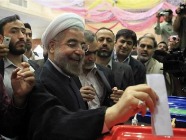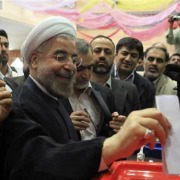
There is rare good news on the Iran front. Last Friday, Iran held elections for its next president - the person who would replace the infamous Mahmoud Ahmedinijad. Million of Iranians - more than 70% of Iran's 50 million registered voters - cast a ballot in this election, and they voted for Hassan Rouhani to be their next president. While these elections were by no standard fully free and fair, starting with the fact that Iran's ruling mullahs disqualified all but a handful of candidates, it is indisputable that something else is also clear: this election was an upset. The winner of these elections was not the candidate of choice of these same mullahs and, comparatively speaking, he is a political and ideological moderate who ran on pro-change, anti-extremism platform.
How can anyone say that Rouhani, a longtime Iranian politician and political insider, is a moderate? Well, he has already pledged to follow a "path of moderation." He has said it is time to heal the "old wound" that is the bad ties with the United States and that he intends to improve relations with neighboring Gulf states. He has called for greater transparency with respect to Iran's nuclear program. (For some insight into Rouhani's views on Iran's nuclear program, check out this 2006 letter he published in Time Magazine).
To be sure, actions speak louder than words. In the coming weeks and months, President Rouhani should be judged, and will be judged, on what he does, not what he says or what people say he represents. Nonetheless, the decisive victory of the man Iranians perceived, as they went to the voting booths, as the "moderate" candidate, is a hopeful development, both for what it says about what Iranians want from their leaders, and for the promise it holds in terms of improving relations and potentially resolving the very serious Iran-related concerns that remain center-stage in Israel, in Washington, and across the international community.
Of course, it's not just actions and words from Iran that will be judged and that can make a difference. Already, the reaction to Rouhani's election from Israel's Prime Minister Benjamin Netanyahu is cause for concern. Indeed, some might conclude that Netanyahu is unhappy that a more extremist candidate - someone who, like Ahmedinijad, would seemingly relish playing the part of the one-dimensional anti-Israel, anti-Semitic, anti-West villain - didn't win.
ARTICLE CONTINUES AFTER DISCUSSION
.
Likewise, there are already some in the U.S. (see here, here, here, and here, for example) who seem intent on preemptively turning their very specific definition of perfect into the proverbial enemy of the potentially-good, transforming any opportunity for progress into an opportunity to take the world ever-faster down a road to a zero-sum confrontation. For some, it seems, the only positive change that can take place in the Iranian government is regime change, period.
The reality is that the challenges posed by the problematic policies of the Iranian regime - the abiding questions regarding its nuclear ambitions, its destabilizing role across the Middle East, its abysmal record with respect to the human rights of its own citizens - won't be magically resolved by the election of a new, not-as-terrible-as-it-might-have-been president - and nobody is suggesting otherwise. But the reality, too, is that the election of this new Iranian president could be the first step toward a new and more constructive, productive chapter in U.S. and international efforts to address all these concerns. Peace- and security-loving people everywhere, and especially in Washington, Tehran, and Israel, should be working today to do whatever they can to ensure that such a new dynamic isn't thwarted by cynics before it even has a chance to start.
As the UK's Jack Straw commented, "Rowhani's election could be the best news in many years for the future of the whole region - for Iran, its economy, and for the nuclear problem, with respect to Syria, Iraq, and Israel and Palestine." And as my friend Yossi Alpher wrote in his analysis of the election, "An avowed moderate elected overwhelmingly through the democratic choice of the Iranian people deserves to be welcomed and given a chance."
Some recommended reading:
Center for American Progress, 6/17:Pragmatist Rowhani Wins, Now What? (by Matt Duss)
Al-Monitor Back Channel, 6/17: Rouhani proposes nuclear transparency, easing US-Iran tensions (by Laura Rozen)
Rand, 6/17: Rouhani's Win in Iran Could be Reason for Optimism
National Security Network 6/17: Sifting Through Implications of the Rouhani Victory
IranWire 6/17: Iran's New President, Consummate Insider
POMED 6/17: Brief on Iranian elections
ForeignPolicy 6/16: Regime Change Obama Can Believe In (by Vali Nasr)
The Telegraph 6/16: Iran's new leader offers hope for the region (by Jack Straw)
The National Interest 6/16: The Iranian People Challenge the West (by Paul Pillar)
IISS 6/16: Give Rowhani a chance (by Mark Fitzpatrick)
